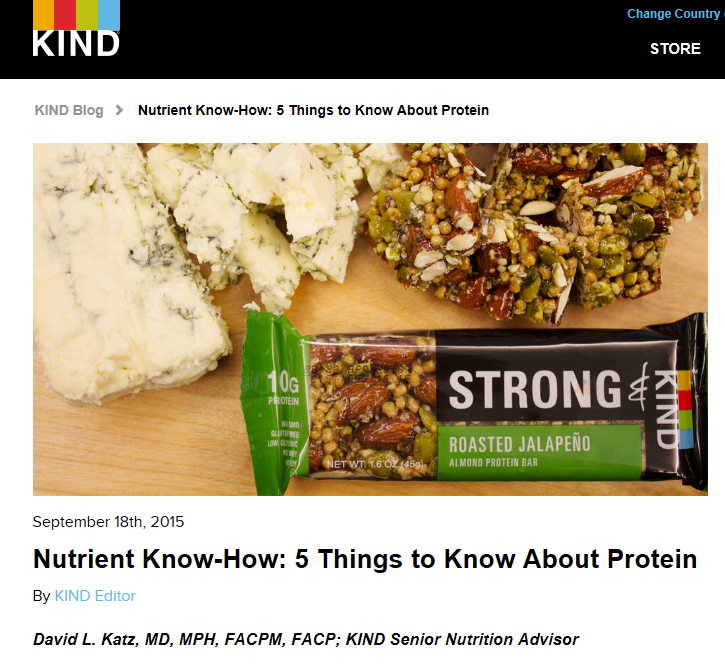5 Things to Know About Protein
Every day, it seems the world is picking on – or raving about – a new nutrient. As of late, protein has been hyped up and added to everything from cereal to water (yes, you read that right!). Of course we all need protein, but consuming an excessive amount isn’t an express ticket to better health. To cut through the protein propaganda, here are few things to keep in mind:
1. Protein deficiency is not a problem in the American population, and special effort to get more is not required since we are getting plenty. On average, males consume ~99 grams/day and women ~68 grams/day. Let’s speak in food language for a moment – this means that if you’re a male, your daily intake looks something like this: 3 large eggs, 4 oz. of cooked salmon, ¾ cup of Greek yogurt, 3 oz. cheese and 1 cup of cooked lentils. This mix far exceeds the Recommended Daily Allowance for protein, which is only 56 grams for men and 46 grams for women. So, knowing that we get plenty of protein, there is no need to go to extra lengths to get more when it’s not required. And, high protein intake isn’t necessarily harmless – studies have suggested that it may lead to increased body weight and health risks, specifically to your heart.
2. In addition to building lean muscle, out of all of the nutrient classes protein is generally the best when it comes to increasing your satiety threshold. This means that compared to carbohydrates and fat, protein helps you feel and stay full for longer periods of time. Increased feelings of satiety help control your food intake and manage body weight. So, while you don’t want to get too much protein, you do want to make sure you’re getting enough.
3. Protein from whole plant-based foods versus animal sources is associated with better health outcomes and has less of an environmental impact. Not sure where to get your fix? Try for a variety of grains, nuts, seeds, lentils, beans and soy protein like tofu.
4. Not all protein sources are created equal. Whereas protein from plant-based foods is preferable, protein in the form of concentrated isolates is not. If you can get all the protein you need from whole food sources that are strongly and consistently linked to better health outcomes, why do anything else? There is no need to rely on protein isolates when there is little evidence suggesting they have health benefits.
5. Eating protein in small, frequent meals helps with portion control. If you’re snacking on-the-go, grab a wholesome nut-based bar, a hard-boiled egg or a cup of Greek yogurt. Even more ideal? Combine protein with other nutrients like fiber and healthy fats. A great option would be a STRONG & KIND bar, which boasts protein, fiber and healthy fat from whole almonds, hemp and pumpkin seeds.
Protein will always be necessary for health, but to maximize its benefits, it’s important to first understand how much your body needs and which foods to get it from. As I’ve always said, get the foods right and the nutrients will take care of themselves.
If interested in more information on protein as well as general tips for snack bar sleuthing, check out my recent post on Medical Daily.
related posts
-
Differentiating meat from alternate sources of protein
A recent health study reiterates the differing health attributes of red meat and processed meat, from alternative proteins such as nuts and how grains. As the study states: A daily 100-gram serving of unprocessed red meat may increase the risk of developing type 2 diabetes by 19%, while just 50 grams of processed red meat [...]
-
The Moment Things Just Took Off
video platformvideo managementvideo solutionsvideo player
-
The benefits of a plant based diet
Food Business News has reported on a study that appeared in the Journal of the American Medical Association which claims that plant based diets lower “bad” cholesterol. People who stuck to a plant based diet experienced a greater reduction in LDL (“bad” cholesterol) compared to those who maintained a low-saturated fat diet. Read more below [...]
-
KIND Gets A Glamour Mention
by Adeena Schlussel on behalf of Daniel Lubetzky Our Mango Macademia bar got a great shout out from Glamour Magazine for being tasty and kind to your weight loss effort! Afternoon Snack: Mango + Macadamia Nuts = A Really Tasty Bar I have a thing for mangoes and macadamia nuts. Together, I just learned, they [...]
-
Things that Scare me About Mitt Romney
1) That he seems to change his positions constantly to pander to the audience asking the question 2) That one of his advisors is Pat Buchanan’s Sister 3) That when I just listened to him be interviewed by Anderson Cooper he carries on for 5 minutes attacking John McCain in very personal ways but then [...]














Comments are closed.